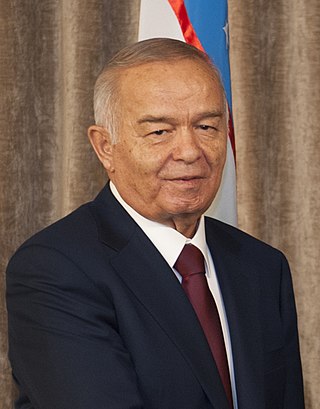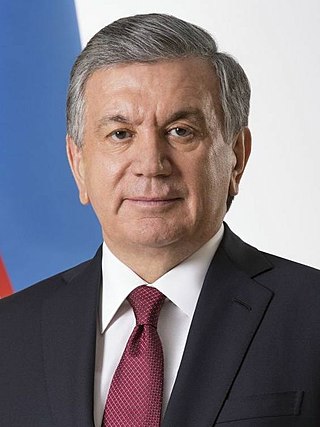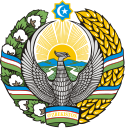
The Republic of Uzbekistan is a presidential constitutional republic, whereby the President of Uzbekistan is head of state. Executive power is exercised by the government and by the Prime Minister of Uzbekistan.

Islam Abduganiyevich Karimov was an Uzbek politician who led Uzbekistan and its predecessor state, the Uzbek Soviet Socialist Republic, from 1989 until his death in 2016. He was the last First Secretary of the Communist Party of Uzbekistan from 1989 to 1991, when the party was reconstituted as the People's Democratic Party of Uzbekistan (O‘zXDP); he led the O‘zXDP until 1996. He was the President of the Uzbek SSR from 24 March 1990 until he declared the independence of Uzbekistan on 1 September 1991.

Shavkat Miromonovich Mirziyoyev is an Uzbek politician who has served as President of Uzbekistan and Supreme Commander-in-Chief of the Armed Forces of Uzbekistan since 14 December 2016. Previously, Mirziyoyev led the government as a Prime Minister of Uzbekistan from 2003 to 2016.

The Parliament of the Republic of Kazakhstan is the bicameral legislature of Kazakhstan. The lower house is the Mäjilis, with 98 seats which are elected to five-year terms. The upper house is the Senate, which has 50 members.

Elections in Kazakhstan are held on a national level to elect a President and the Parliament, which is divided into two bodies, the Majilis and the Senate. Local elections for maslihats are held every five years.

The Uzbekistan Liberal Democratic Party (UzLiDeP) is a political party in Uzbekistan and the country's ruling party. The four other parties in the Oliy Majlis, Uzbekistan's parliament, are pro-government.

Presidential elections were held in Uzbekistan on 23 December 2007. Incumbent president Islam Karimov was re-elected with 91% of the vote.

The People's Democratic Party of Uzbekistan is a political party in Uzbekistan. It was founded in 1991 as the legal successor of the Communist Party of Uzbekistan. Under its founder Islam Karimov, it oversaw the dissolution of the Uzbek Soviet Socialist Republic and the establishment of the Republic of Uzbekistan. After Karimov resigned from the party in 1996 and later formed the Uzbekistan Liberal Democratic Party, it lost its ruling party status.

Presidential elections were held in Uzbekistan on 9 January 2000. The result was a victory for incumbent Islam Karimov, who received 96% of the vote. Turnout was reported to be 95%.

Presidential elections were held in Kazakhstan on 10 January 1999. Incumbent president Nursultan Nazarbayev won the election with over 80% of the vote, and was sworn into office on 20 January 1999. Most observers viewed the election as blatantly unfair, further confirming that Nazarbayev was not interested in promoting a democratic system of government. Voter turnout was reported to be 87%.

Parliamentary elections were held in Moldova on 5 April 2009. The Party of Communists of the Republic of Moldova (PCRM) won a majority of seats for the third consecutive occasion. Turnout was 59%, exceeding the 50% necessary for the election to be valid.

Presidential elections were held in Armenia on 19 February and 5 March 2003. No candidate received a majority in the first round of the election with the incumbent President Robert Kocharyan winning slightly under 50% of the vote. Therefore, a second round was held and Kocharyan defeated Stepan Demirchyan with official results showed him winning just over 67% of the vote. However, both the opposition and international observers said that the election had seen significant amounts of electoral fraud and the opposition did not recognise the results of the election.
Direct presidential elections were held for the first time in Uzbekistan on 29 December 1991. Their result was a victory for Islam Karimov of the People's Democratic Party of Uzbekistan, who won with 87% of the vote. Voter turnout was reported to be 94%. The elections were held alongside an independence referendum.

Presidential elections were held in Azerbaijan on 9 October 2013. The result was a victory for incumbent President Ilham Aliyev, who received a reported 84.5% of the vote, whilst leading opposition candidate Jamil Hasanli finished second with a reported 5.5% of the vote.

Presidential elections were held in Azerbaijan on 11 April 2018. The elections were the first since the 2016 constitutional referendum, which extended the presidential term from five to seven years. Incumbent President Ilham Aliyev was re-elected president for a seven-year term. The elections, which took place in an authoritarian context, were characterized as fraudulent. Major opposition parties were disqualified before the election. Eight candidates ran for the presidency, although there were doubts as to whether the opposition candidates were genuine candidates.
The following lists events that happened during 2015 in Uzbekistan.

Snap presidential elections were held in Kazakhstan on 26 April 2015 to elect the President of Kazakhstan. This was the fifth presidential election held and second without having any formal opposition candidates. With the highest-ever nationwide turnout of 95.2%, the result was a victory for long-term incumbent President Nursultan Nazarbayev of Nur Otan who received 97.8% of the vote, the largest since 1991, thus winning a fifth term in office while his closest challenger, Turgyn Syzdyqov, received only 1.6% of the votes.

Legislative elections were held in Kazakhstan on 20 March 2016. The date was set by president Nursultan Nazarbayev on 20 January 2016, when he dissolved the Mäjilis after it had requested dissolution on 13 January, with the reason cited being the economic crisis caused by low oil prices. Normally, the term of the Mäjilis would have expired in fall of 2016.

Snap presidential elections were held in Uzbekistan on 4 December 2016, following the death of incumbent President Islam Karimov on 2 September. The constitution mandated that the election be held within three months of Karimov's death. Interim President Shavkat Mirziyoyev won the elections with 90% of the vote. The elections were described by the Economist as a sham, and by the Organization for Security and Co-operation in Europe as lacking "a genuine choice".

Presidential elections were held in Uzbekistan on 24 October 2021. This was the sixth presidential election held since independence. Incumbent President Shavkat Mirziyoyev won a second term with a majority 80.1% of the vote, although faring the lowest performance for an incumbent in terms of vote share since 1991. Maqsuda Vorisova from the People's Democratic Party of Uzbekistan (XDP) was the runner-up and Alisher Qodirov from the Uzbekistan National Revival Democratic Party came third, which marked the first time that more than two candidates had officially received more than 5% of the vote.














